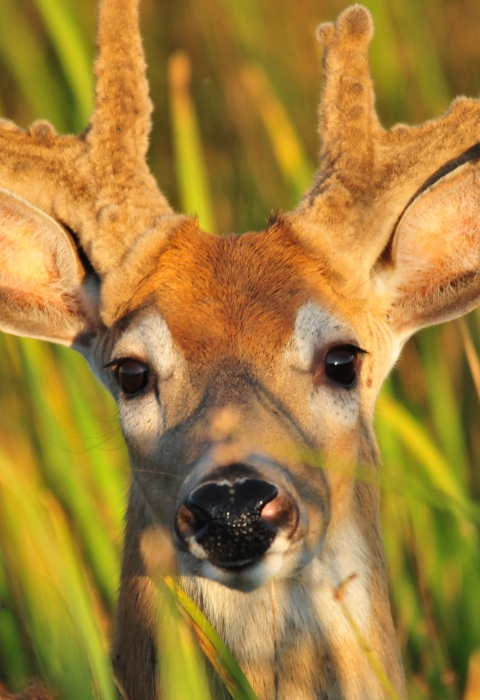We are focused on providing more access to quality hunting and fishing opportunities for all Americans. Part of our mission-critical work to make that possible lies in stopping the illegal commercialization of captive-bred white-tailed deer. Together with our counterparts in state wildlife management agencies across the country, we are slowing the spread of chronic wasting disease. Here’s a recent success story.
The U.S. Attorney’s Office for the Northern District of Alabama recently sentenced a licensed Alabama deer breeder and his associate for illegally transporting captive-bred and raised white-tailed deer from a facility in Indiana to his deer breeder facility in Alabama. Lewis H. Skinner, 56, and his associate Franklin Banks Loden, 56, both of Northport, Alabama were found guilty of knowingly transporting and receiving white-tailed deer in interstate commerce on April 11, 2018. These actions violated both Alabama State law and the federal Lacey Act.
Chronic Wasting Disease affects the central nervous system of deer species, including white-tailed deer, elk and moose. The disease attacks the brain of an infected animal causing it to become emaciated, display abnormal behavior, lose bodily functions, and die. Chronic Wasting Disease is infectious, communicable and 100 percent fatal.
“Keeping wild populations safe from chronic wasting disease and other pathogens is important. We look for more opportunities to collaborate with our state and tribal partners to protect resources for the benefit of America’s sportsmen and women,” said U.S. Fish and Wildlife Service Office of Law Enforcement Acting Assistant Director Edward Grace.
This was not an isolated incident, unfortunately. As the owner and operator of Skinner Farms, a private deer breeding business in Sumter County, Alabama, Skinner had been breaking the law almost since he first obtained his deer breeder permit from the State of Alabama at the end of 2014. And he did so with the knowledge that Alabama is a “closed border” state that prohibits importing deer. While this case led to charges of only one illegal shipment of deer in February of 2015, investigators also knew of two other shipments that violated state and federal law. One such shipment involved the shipment of 15 pregnant does in February 2015 and an additional shipment of six other does in October 2015.
In November 2016, Skinner arranged for Loden to move six captive-bred white-tailed deer covertly from Indiana to Skinner Farms in Alabama. Alabama Department of Conservation and Natural Resource law enforcement officers stopped Loden in transit and seized the deer in Tuscaloosa. Investigators determined that some of these illegally transported deer were lacking the required identification, such as a numbered ear tag or tattoo for the Chronic Wasting Disease Herd Certification Program. The deer in question, fawns from a previously certified herd, rendered the farm and the other deer disqualified from the program, because of the lack of identification.
“The illegal transport of deer from outside the State of Alabama by a licensed deer breeder motivated solely by profit places our entire white-tailed deer herd at risk of this fatal disease,” said Alabama Wildlife and Freshwater Fisheries Division Chief of Enforcement Michael Weathers.
Skinner was ordered to pay $650,000 in restitution to the Alabama Conservation Fund and $100,000 in fines to the Lacey Act Reward account. In addition to being ordered to serve two years of probation, Skinner’s deer farm was depopulated and he can no longer engage in commercial captive deer breeding. Skinner also lost his privilege to hunt deer while on probation.
Loden is also no longer allowed to engage in commercial captive deer breeding and was ordered to complete 20 hours of community service for his role in these crimes. In addition, Loden is serving two years probation, during which time he will lose his deer hunting privileges.
Alabama Department of Conservation and Natural Resource - Wildlife and Freshwater Fisheries Division investigated the case in cooperation with the U.S. Fish and Wildlife Service Office of Law Enforcement. Assistant U.S. Attorney Henry Cornelius prosecuted the case.





